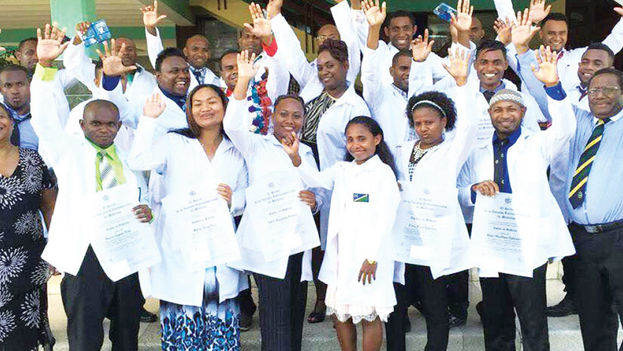
![]() 14ymedio, Havana, 14 August 2017 — The government of the Solomon Islands, an archipelago located in Oceania and part of the British Commonwealth of Nations, has suspended the sending of medical students to Cuba, according to comments from the Permanent Secretary of the Ministry of Health and Medical Services, Tenneth Dalipandam speaking to the local newspaper, the Solomon Star.
14ymedio, Havana, 14 August 2017 — The government of the Solomon Islands, an archipelago located in Oceania and part of the British Commonwealth of Nations, has suspended the sending of medical students to Cuba, according to comments from the Permanent Secretary of the Ministry of Health and Medical Services, Tenneth Dalipandam speaking to the local newspaper, the Solomon Star.
The official said Friday that authorities are considering “training the Cuban graduates to a certain level” before they reconsider “sending students” to the island in the future.
The President of the Education Committee of Parliament and Human Resources of the Archipelago, Nestor Ghiro, also previously stated that graduates in Cuba “are not doctors until they complete certain stages of training in [their home] country to qualify as doctors.”
Ghiro pointed out that they cannot even be called “doctors” until their training is completed in the Solomon Islands.
In 2007 the Cuban Ministry of Public Health and the Ministry of Health and Medical Services of Solomon Islands signed a cooperation agreement. The legal instrument opened the way for fifty young people to study medicine in Cuba, a figure that reached 150 students seven years later.
Cuba covers the costs of the schooling and the Government of Solomon Islands is responsible for paying for air tickets and other student expenses. Most of these young people study at the Latin American School of Medicine (ELAM), which since 2005 has graduated more than 28,000 doctors from 103 countries.
The two nations established diplomatic ties in December 2003 and a decade later the first Solomon Islands embassy in all of Latin America was opened in Havana.
The Solomon Island’s cancellation of sending students to Cuba is not an isolated event. The professional quality of Cuban graduates has been questioned in countries such as Uruguay, Brazil, Costa Rica and Pakistan, among other nations.
Chilean doctors graduated from ELAM have also faced serious difficulties in passing the theoretical-practical exams required to practice their profession in Chile.
In 2012, of the 477 students graduating from foreign universities who presented themselves in Chile to take the National Examination of Medical Knowledge, only 20% passed. The majority of those who did not pass the exam had obtained their degrees in Cuba.
